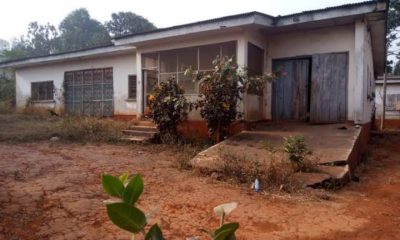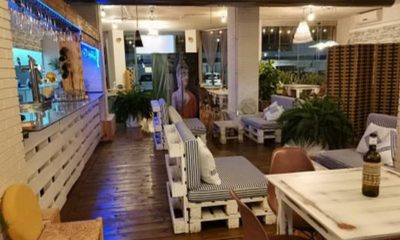Business
HOW MORTGAGES WORK IN NIGERIA by Dennis Isong

HOW MORTGAGES WORK IN NIGERIA by Dennis Isong
Sahara Weekly Reports That Mortgages play a pivotal role in the real estate sector, allowing individuals and families to own homes without the need for substantial upfront payments. In Nigeria, as in many countries, mortgages are a common means of financing homeownership. This article aims to provide a comprehensive overview of how mortgages work in Nigeria, covering the key aspects, processes, and considerations.
1. Types of Mortgages in Nigeria
In Nigeria, there are various types of mortgages available to suit different needs and financial situations. The most common types include:
a. Home Purchase Mortgage: This is the traditional form of mortgage used for buying a new home or property.
b. Home Equity Release Mortgage: This allows homeowners to access the equity in their property to meet other financial needs.
c. Construction Mortgage: Designed for those building their homes, this type of mortgage provides funds in stages during construction.
d. Refinancing Mortgage: Allows homeowners to replace an existing mortgage with a new one, often with better terms.
2. Mortgage Providers
Mortgages in Nigeria are typically provided by banks, mortgage banks, and other financial institutions. Some of the well-known mortgage banks in Nigeria include the Federal Mortgage Bank of Nigeria (FMBN), which focuses on affordable housing, and commercial banks like Zenith Bank, First Bank, and GTBank.
3. Eligibility Criteria
To qualify for a mortgage in Nigeria, individuals must meet certain eligibility criteria, which may include:
– Proof of regular income
– Good credit history
– Down payment capability
– Legal age (usually 18 years or older)
– Nigerian citizenship or legal residency
4. The Mortgage Application Process
The mortgage application process in Nigeria involves several steps:
a. Prequalification: Potential borrowers assess their financial status, calculate affordability, and choose a suitable mortgage type.
b. Documentation: Applicants provide necessary documents such as proof of income, identification, and property details.
c. Property Valuation: The lender evaluates the property’s value to determine the loan amount.
d. Credit Assessment: Lenders assess the borrower’s creditworthiness by reviewing credit reports and history.
e. Approval and Disbursement: Upon approval, the mortgage is disbursed, and the borrower takes ownership of the property.
5. Mortgage Terms and Conditions
Mortgages in Nigeria typically have terms ranging from 10 to 25 years. Interest rates can be fixed or variable, and the repayment structure can be monthly, quarterly, or annually.
6. Mortgage Insurance
Mortgage insurance is often required, especially for mortgages with smaller down payments. This insurance protects the lender in case the borrower defaults on the loan.
7. Repayment and Default
Borrowers must make regular payments to avoid default. Defaulting on a mortgage can result in the lender repossessing the property, so it’s essential to honor the repayment schedule.
8. Government Initiatives
The Nigerian government has introduced several initiatives to promote affordable housing and increase access to mortgages. The FMBN, for instance, offers the National Housing Fund (NHF) scheme, which provides affordable mortgage loans to contributors.
9. Tax Implications
It’s important for prospective homeowners in Nigeria to be aware of the tax implications associated with mortgages. Mortgage interest paid on a primary residence is often eligible for tax deductions, which can help reduce the overall cost of homeownership. Tax laws and regulations may vary, so consulting with a tax professional is advisable.
10. Benefits of Mortgages in Nigeria
Owning a home through a mortgage in Nigeria offers several advantages:
a. Asset Appreciation: Real estate in Nigeria generally appreciates over time, potentially increasing the value of your investment.
b. Forced Savings: Paying a mortgage every month encourages disciplined saving, as a portion of each payment goes toward building home equity.
c. Housing Security: Homeownership provides stability and security for you and your family.
d. Investment Opportunity: Owning property can open doors to real estate investment and rental income.
e. Access to Government Schemes: Many government initiatives and incentives are designed to make homeownership more accessible, particularly for low and middle-income earners.
11. Challenges and Risks
While mortgages offer numerous benefits, they also come with potential challenges and risks:
a. Interest Rate Fluctuations: Variable interest rates can lead to fluctuations in monthly payments, impacting borrowers’ budgets.
b. Economic Factors: Economic downturns can affect borrowers’ ability to make mortgage payments, leading to defaults.
c. Property Market Volatility: Real estate markets can be unpredictable, potentially affecting property values.
d. Legal and Documentation Complexities: Navigating the legal and documentation requirements of mortgages can be complex and time-consuming.
e. Default Consequences: Defaulting on a mortgage can result in foreclosure and the loss of the property.
12. Expert Advice
Before embarking on the mortgage application process in Nigeria, it’s advisable to seek expert advice. Consult with financial advisors, real estate professionals, and legal experts to ensure you make informed decisions that align with your financial goals and circumstances.
Dennis Isong is a TOP REALTOR IN LAGOS.He Helps Nigerians in Diaspora to Own Property In Lagos Nigeria STRESS-FREE. For Questions WhatsApp/Call 2348164741041
Business
Nigeria’s Inflation Drops to 15.10% as NBS Reports Deflationary Trend

Nigeria’s headline inflation rate declined to 15.10 per cent in January 2026, marking a significant drop from 27.61 per cent recorded in January 2025, according to the latest Consumer Price Index (CPI) report released by the National Bureau of Statistics.
The report also showed that month-on-month inflation recorded a deflationary trend of –2.88 per cent, representing a 3.42 percentage-point decrease compared to December 2025. Analysts say the development signals easing price pressures across key sectors of the economy.
Food inflation stood at 8.89 per cent year-on-year, down from 29.63 per cent in January 2025. On a month-on-month basis, food prices declined by 6.02 per cent, reflecting lower costs in several staple commodities.
The data suggests a sustained downward trajectory in inflation over the past 12 months, pointing to improving macroeconomic stability.
The administration of President Bola Ahmed Tinubu has consistently attributed recent economic adjustments to ongoing fiscal and monetary reforms aimed at stabilising prices, boosting agricultural output, and strengthening domestic supply chains.
Economic analysts note that while the latest figures indicate progress, sustaining the downward trend will depend on continued policy discipline, exchange rate stability, and improvements in food production and distribution.
The January report provides one of the clearest indications yet that inflationary pressures, which surged in early 2025, may be moderating.
Bank
Alpha Morgan to Host 19th Economic Review Webinar

Alpha Morgan to Host 19th Economic Review Webinar
In an economy shaped by constant shifts, the edge often belongs to those with the right information.
On Wednesday, February 25, 2026, Alpha Morgan Bank will host the 19th edition of its Economic Review Webinar, a high-level thought leadership session designed to equip businesses, investors, and individuals with timely financial and economic insight.
The session, which will hold live on Zoom at 10:00am WAT and will feature economist Bismarck Rewane, who will examine the key signals influencing Nigeria’s economic direction in 2026, including policy trends, market movements, and global developments shaping the local landscape.
With a consistent track record of delivering clarity in uncertain times, the Alpha Morgan Economic Review continues to provide practical context for decision-making in a dynamic environment.
Registration for the 19th Alpha Morgan Economic Review is free and can be completed via https://bit.ly/registeramerseries19
It is a bi-monthly platform that is open to the public and is held virtually.
Visit www.alphamorganbank to know more.
Business
GTBank Launches Quick Airtime Loan at 2.95%

GTBank Launches Quick Airtime Loan at 2.95%
Guaranty Trust Bank Ltd (GTBank), the flagship banking franchise of GTCO Plc, Africa’s leading financial services group, today announced the launch of Quick Airtime Loan, an innovative digital solution that gives customers instant access to airtime when they run out of call credit and have limited funds in their bank accounts, ensuring customers can stay connected when it matters most.
In today’s always-on world, running out of airtime is more than a minor inconvenience. It can mean missed opportunities, disrupted plans, and lost connections, often at the very moment when funds are tight, and options are limited. Quick Airtime Loan was created to solve this problem, offering customers instant access to airtime on credit, directly from their bank. With Quick Airtime Loan, eligible GTBank customers can access from ₦100 and up to ₦10,000 by dialing *737*90#. Available across all major mobile networks in Nigeria, the service will soon expand to include data loans, further strengthening its proposition as a reliable on-demand platform.
For years, the airtime credit market has been dominated by Telcos, where charges for this service are at 15%. GTBank is now changing the narrative by offering a customer-centric, bank-led digital alternative priced at 2.95%. Built on transparency, convenience and affordability, Quick Airtime Loan has the potential to broaden access to airtime, deliver meaningful cost savings for millions of Nigerians, and redefine how financial services show up in everyday life, not just in banking moments.
Commenting on the product launch, Miriam Olusanya, Managing Director of Guaranty Trust Bank Ltd, said: “Quick Airtime Loan reflects GTBank’s continued focus on delivering digital solutions that are relevant, accessible, and built around real customer needs. The solution underscores the power of a connected financial ecosystem, combining GTBank’s digital reach and lending expertise with the capabilities of HabariPay to deliver a smooth, end-to-end experience. By leveraging unique strengths across the Group, we are able to accelerate innovation, strengthen execution, and deliver a more integrated customer experience across all our service channels.”
Importantly, Quick Airtime Loan highlights GTCO’s evolution as a fully diversified financial services group. Leveraging HabariPay’s Squad, the solution reinforces the Group’s ecosystem proposition by bringing together banking, payment technology, and digital channels to deliver intuitive, one-stop experiences for customers.
With this new product launch, Guaranty Trust Bank is extending its legacy of pioneering digital-first solutions that have redefined customer access to financial services across the industry, building on the proven strength of its widely adopted QuickCredit offering and the convenience of the Bank’s iconic *737# USSD Banking platform.
About Guaranty Trust Bank
Guaranty Trust Bank (GTBank) is the flagship banking franchise of GTCO Plc, a leading financial services group with a strong presence across Africa and the United Kingdom. The Bank is widely recognized for its leadership in digital banking, customer experience, and innovative financial solutions that deliver value to individuals, businesses, and communities.
About HabariPay
HabariPay is the payments fintech subsidiary of GTCO Plc, focused on enabling fast, secure, and accessible digital payments for individuals and businesses. By integrating payments and digital technology, HabariPay supports innovative services that make everyday financial interactions simpler and more seamless.
Enquiries:
GTCO
Group Corporate Communication
[email protected]
+234-1-2715227
www.gtcoplc.com
-

 celebrity radar - gossips6 months ago
celebrity radar - gossips6 months agoWhy Babangida’s Hilltop Home Became Nigeria’s Political “Mecca”
-

 society6 months ago
society6 months agoPower is a Loan, Not a Possession: The Sacred Duty of Planting People
-

 society5 months ago
society5 months agoReligion: Africa’s Oldest Weapon of Enslavement and the Forgotten Truth
-

 news6 months ago
news6 months agoTHE APPOINTMENT OF WASIU AYINDE BY THE FEDERAL GOVERNMENT AS AN AMBASSADOR SOUNDS EMBARRASSING









